JOHN FENG
The People's Republic of China seized control of Tibet in 1950 in what its leaders termed the "peaceful liberation" of a theocracy. Generations of Tibetans in exile continue to call it an invasion and annexation of a de facto independent region, where rich cultural roots are at risk of being buried in obscurity.
Otherwise tranquil Tibetan Buddhists once turned parts of their historical homeland into some of the country's most restive regions, first in 1959 and again nearly a half-century later—both ended in bloodshed. Sporadic resistance against the Chinese government's rule continued, but in each instance, Beijing further clenched its authoritarian fist in pursuit of synthetic ethnic unity under a single banner of the Communist Party.
Tibet has essentially been a police state for more than a decade, observers say, marked by near-constant technological and human surveillance as well as a heavy law enforcement presence at religious sites, including the capital, Lhasa.
The West is familiar with Beijing's heavy-handed approach in Xinjiang. What is less well known, activists say, are its systematic efforts to erase Tibetan identity, including by indoctrinating children. Under the authority of Chinese leader Xi Jinping, Tibetans are increasingly seeing the government's cultural and political "Sinicization" policies manifest in some of the ethnic group's youngest members.
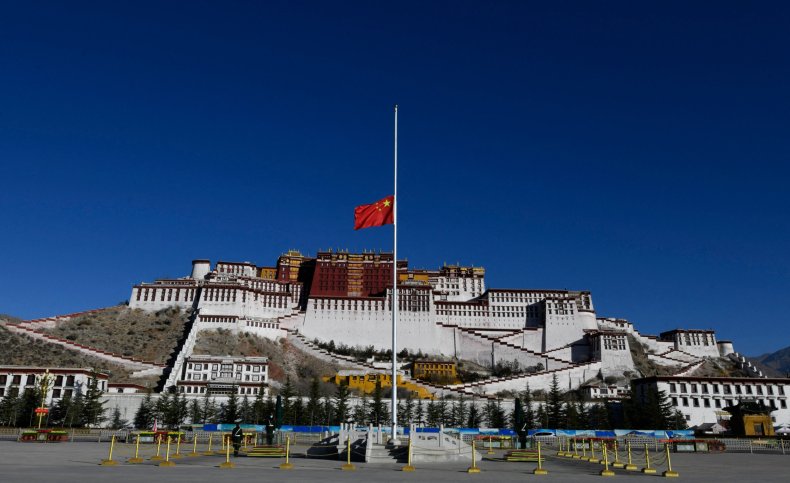 The Chinese national flag flies at half-mast for the passing of former Chinese leader Jiang Zemin, in front of the Potala Palace in Lhasa, in Tibet Autonomous Region, China, on December 6, 2022.CNS/AFP VIA GETTY IMAGES
The Chinese national flag flies at half-mast for the passing of former Chinese leader Jiang Zemin, in front of the Potala Palace in Lhasa, in Tibet Autonomous Region, China, on December 6, 2022.CNS/AFP VIA GETTY IMAGESIn early February, a group of United Nations special rapporteurs said they were alarmed by the placement of about 1 million Tibetan children in China's residential school system as part of the country's compulsory education. Removed from their family homes, young Tibetans are taught in environments built around dominant Han Chinese culture, in which substantive access to their own cultural, religious and linguistic roots is severely restricted.
"As a result, Tibetan children are losing their facility with their native language and the ability to communicate easily with their parents and grandparents in the Tibetan language, which contributes to their assimilation and erosion of their identity," said the independent experts, whose roles are mandated by the U.N. Human Rights Office.
The Chinese Foreign Ministry, which has rebuffed similar concerns from U.N. fact finders since 2010, condemned the statement as "lies and rumors" aimed at discrediting China's achievements.
"We urge these experts to...perform their duty in a fair and objective manner, stop politicizing and instrumentalizing human rights issues," a spokesperson said. "Otherwise, they will risk losing their own credibility."
The U.N.'s understanding of the situation is aided by evidence collected by nonprofits like the Boston-based Tibet Action Institute, founded by Lhadon Tethong. In a December 2021 report on China's "colonial boarding schools," the group found that nearly 80 percent of Tibetan children between the ages of 6 and 18 were enrolled in residential schools, compared to the national average of just over 20 percent.
In remote farming and nomadic communities of majority Tibetan areas, children as young as 4 are boarding in preschool, where, despite the official promise of bilingual education, pupils are instructed almost exclusively in Mandarin, the report said. The Chinese government has facilitated the expansion of the program by shuttering Tibetan schools and suppressing teaching initiatives by community leaders, compelling—or in some cases coercing—parents to send away their children.
Tethong, a Tibetan Canadian, sees similarities with the treatment of indigenous peoples in North America in the previous centuries, although on a much larger scale. And like those who survived the schools that existed in Canada and the United States, traumatized former students testified to poor living conditions and no protection against sexual violence and other misconduct.
"It's a classic colonial system designed to erase the Tibetan identity and culture of this whole generation, by not just putting them in schools to streamline or fast-track it, but to remove them from their parents, families and communities so that transmission of language and culture isn't there," Tethong told Newsweek.
"Tibetans live in Tibet; they're not Chinese. But somehow speaking Chinese, being Chinese and being loyal to the Communist Party in Beijing is more important than our ancient culture, traditions and rights," she said. "It doesn't matter if the schools are gleaming new and the children wear Tibetan chubas, have one Tibetan class a day and are fed Tibetan food, if the intent of the program is to remove the Tibetan out of the child."
Before Xi's arrival, there was some religious and cultural tolerance, but that's "all out the window now." What remains is "window dressing," Tethong said. "This whole thing, taken together, is genocide. It's a genocidal policy. There's no benevolent intention here."
Pedagogical Revolution
Gyal Lo, a Tibetan scholar who has a doctorate in educational sociology, said the Chinese government began expanding its residential school program for Tibetans in the late 1970s and early 1980s. Parents were "very resistant" because of the Han Chinese-dominated curriculum, which has only become more restrictive.
A pupil from the countryside can spend up to 15 years in boarding school, depending on the family's ease of access to primary and secondary education facilities, he said. Children are permitted to travel home on weekends and during summer and winter breaks, but they quickly grow distant because of a lack of cultural connections—the result of one hour of Tibetan class a day, or sometimes none at all, "ever since Xi Jinping came to power," Gyal Lo told Newsweek.
"I've seen with my own eyes the children becoming unwilling to speak with their families after just three months in these schools," said Gyal Lo, who fled to Canada for political reasons on the last day of 2020. "Firstly, they no longer have the ability to use the language. Secondly, their psychology changes and they're unwilling to maintain close relations with their families. They become emotionally distant. It's not only about the language.
"I call it a pedagogical revolution because it affects their psychological development. The survival of Tibetan culture is in serious danger. Culture is passed on by human beings. If people aren't exposed to language and culture, they cannot pass them on, and they disappear from the consciousness."
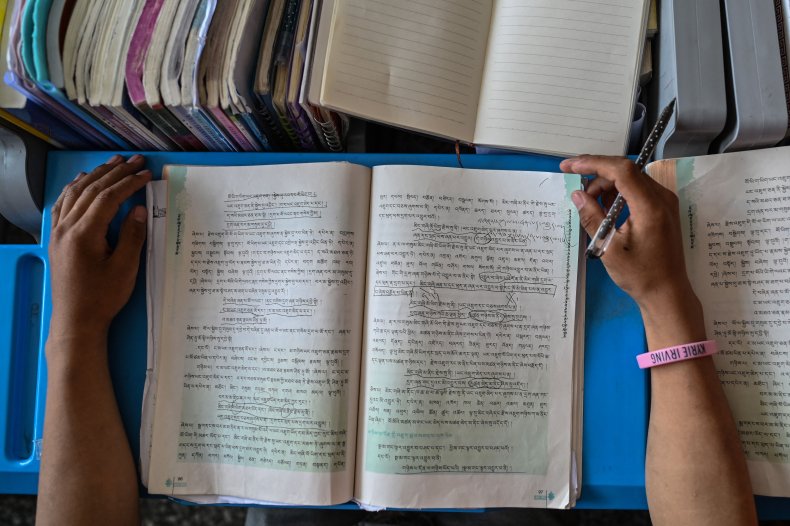 This photograph taken during a government-organized media tour of China’s Tibet Autonomous Region shows a student in his classroom at the Lhasa Nagqu No. 2 Senior High School on June 1, 2021, in the regional capital Lhasa. In residential schools in majority Tibetan areas, some children receive one Tibetan language class a day, while others are instructed exclusively in Mandarin, rights experts say.HECTOR RETAMAL/AFP VIA GETTY IMAGES
This photograph taken during a government-organized media tour of China’s Tibet Autonomous Region shows a student in his classroom at the Lhasa Nagqu No. 2 Senior High School on June 1, 2021, in the regional capital Lhasa. In residential schools in majority Tibetan areas, some children receive one Tibetan language class a day, while others are instructed exclusively in Mandarin, rights experts say.HECTOR RETAMAL/AFP VIA GETTY IMAGESRights researchers who last month gave expert testimony to the Committee on Economic, Social and Cultural Rights were frustrated when Chinese representatives offered official accounts of their government's policies that largely contradicted the lived experiences of those on the ground in the Tibet region. The U.N. treaty body's quadrennial review of China, the first since 2014, had been delayed by Beijing's tactical stalling, rights groups said.
The committee issued concluding observations on March 6 that found China's ethnic minorities continued to face "severe restrictions in the realization of their right to take part in cultural life." The panel urged the government to "immediately abolish the coerced residential school system imposed on Tibetan children," and allow the establishment of private Tibetan schools to ensure their full cultural rights.
China's diplomatic mission in Geneva didn't return an emailed request for comment but said it would "carefully study" the committee's findings, according to a response submitted to the body's database. At the same time, Beijing said it regretted that the panel had cited "false information and rumors" on China's ethnic policy: "The recommendations arising therefrom are untruthful, full of bias and double standards. China rejected those recommendations."
The schools attended by Tibetan children "are fundamentally different" from the colonial boarding schools previously established in the West, the statement said. "Boarding schools provide courses on Tibetan, ethnic dances and other traditional cultures, as well as traditional food of the plateau. Students can also wear ethnic clothes at school."The events in Lhasa and Urumqi indicated the failure of CCP ethnic policy. But instead of adjusting ethnic policy in order to address real grievances, the CCP has instead moved toward asserting firmer control.
Adrian Zenz, Senior Fellow and Director in China Studies, Victims of Communism Memorial Foundation, Washington, D.C.
Volker Türk, the U.N. high commissioner for human rights, said a day after the committee published its report that his office had "opened up channels of communication" with China to follow up on issues including the protection of Tibetans and Uyghurs, the nearly 12 million mostly Muslim minority group that the Human Rights Office concluded last August was subject to possible crimes against humanity as a result of repressive policies in northwestern China.
"In the Xinjiang region, my office has documented grave concerns—notably large-scale arbitrary detentions and ongoing family separations—and has made important recommendations that require concrete follow-up," Türk said, without elaborating.
The U.N. rights office didn't return an email by Newsweek seeking comment.
One China, Many Tibets
China's once-a-decade census put the country's population of ethnic Tibetans at 7 million as of 2020, while outside estimates place the number at about 6 million. Half live in the Tibet Autonomous Region in southwestern China in an area roughly one-third the size of ethno-cultural Tibet, which is split into nominally autonomous prefectures in the neighboring provinces of Sichuan, Yunnan, Qinghai and Gansu.
In late February, Qin Gang, China's foreign minister, told the U.N. Human Rights Council that "some forces with hidden agendas" were politicizing rights issues in Xinjiang and Tibet "in an attempt to smear China and suppress its development." Chinese officials say the country's 55 minority groups each has a right to language and culture, and under the Communist Party's leadership, their regions have enjoyed increased literacy and significant economic development, too.
But in Tibet, as in Xinjiang, China has limited the access of "unfriendly" members of the foreign press. The images that followed a rare government-organized visit to the region in June 2021 did little to arrest growing concern from NGOs like the one run by Tethong, who said there remains a "near total information blackout and lockdown of Tibet."
Thousands of Tibetans refugees used to cross the Himalayas on foot each year to reach Nepal and India.
"Only a handful made it across last year," Tethong said. "They provide the clearest and richest picture of what's happening on the ground, region to region, area to area. It took us a while to figure out what was happening, and we had to piece together this picture like putting together shards of glass."
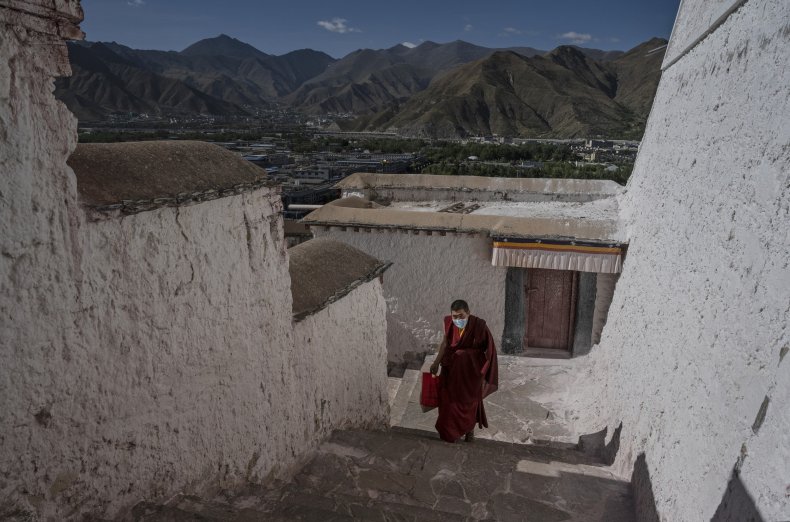 A Tibetan Buddhist monk walks up the stairs in the Potala Palace, a UNESCO heritage site, during a government-organized visit for journalists on June 1, 2021, in Lhasa, Tibet Autonomous Region, China.KEVIN FRAYER/GETTY IMAGES
A Tibetan Buddhist monk walks up the stairs in the Potala Palace, a UNESCO heritage site, during a government-organized visit for journalists on June 1, 2021, in Lhasa, Tibet Autonomous Region, China.KEVIN FRAYER/GETTY IMAGESAdrian Zenz, the director of China studies at the Victims of Communism Memorial Foundation in Washington, D.C., said Beijing's method of targeting Tibetan children "is very much about long-term control," especially over the younger generation.
"There's an aspect of wanting to improve education by centralizing schools, closing down small schools of poor quality, eliminating the commute for children and letting them go to centralized boarding schools," Zenz told Newsweek. "So we cannot entirely dismiss that it is about improving educational quality.
"But of course, a very primary aspect of that for the CCP in all the more sensitive minority regions has been social control. It is about indoctrinating children. It is about teaching them the Chinese language and CCP ideology. If we look at the development of ethnic policy, assimilation and ideological indoctrination have been significantly on the rise."
Aspects of the Chinese government's repression of Tibet predate its aggressive and extensive crackdown in Xinjiang, according to Zenz, who was sanctioned by Beijing in March 2021 for his research, which often involves analysis of official documents and statistics.
China's labor transfer schemes, which Zenz said have reached an alarming scale and scope in recent years, were also pioneered in Tibet. The programs began forcing ethnic minorities from traditional livelihoods into jobs that produced a measurable income in order to achieve Xi's goal of poverty alleviation by the end of the previous decade.
The securitization of the two regions, however, is linked to senior Communist Party official Chen Quanguo, who has been the subject of Magnitsky sanctions since 2020. He introduced policing and surveillance tactics in Tibet while serving as party secretary from 2011-2016, before running the same playbook in Xinjiang from 2016-2021. Both were a response to anti-government unrest in the respective regional capitals of Lhasa in 2008 and Urumqi in 2009.
"The events in Lhasa and Urumqi indicated the failure of CCP ethnic policy. But instead of adjusting ethnic policy in order to address real grievances, the CCP has instead moved toward asserting firmer control," said Zenz, who noted that Beijing's campaign of mass internment and reeducation in Xinjiang—both linked to counterterrorism—isn't present in Tibet.
"In Tibet, we do see targeted reeducation, especially for religious practitioners, but nothing like the scale of mass internment in Xinjiang," he said. "Under Xi Jinping, all kinds of repressive policies have gotten worse, including for the Han, and certainly also for Tibetans. It's the assimilatory pressure, the securitization, the suppression of freedom, the monitoring of social media and the closing of the borders. The freedoms in Tibet have been significantly curtailed since 2010."
The desire for social control in Tibet, a sensitive border region, also concerns national security because of a long-running political dispute about the Dalai Lama and his successor, whom China would like to pick. The Tibetan spiritual leader has been living in exile in India since the failed Tibetan uprising more than 60 years ago. Beijing considers him a separatist.
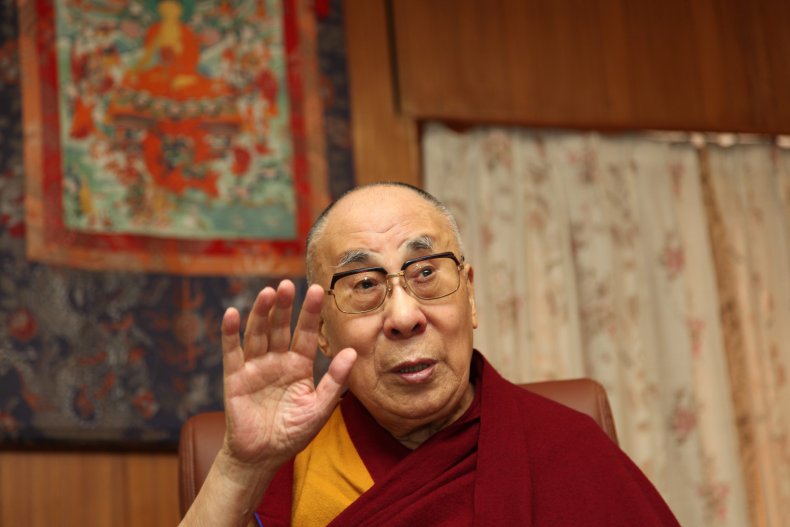 Tibetan spiritual leader the Dalai Lama speaks at a book event Mcleod Ganj on March 20, 2019, in Dharamshala, India.PALLAVA BAGLA/GETTY IMAGES
Tibetan spiritual leader the Dalai Lama speaks at a book event Mcleod Ganj on March 20, 2019, in Dharamshala, India.PALLAVA BAGLA/GETTY IMAGESTalk About Tibet
China's leaders say Tibet is a model of successful "leapfrog development," with the region rising in indexes such as economic output and average life expectancy. But activists argue it has come at an unacceptable cost to Tibetan identity.
"Poverty alleviation and culture are two different concepts. One is about the right to live; the other is the right to culture. You can't use one to deny the other," said Gyal Lo, who has researched Tibetan education for three decades. He uses the phrase "boiling the frog" to describe China's "institutionalized weakening and erasure of Tibetan language and culture."
Beijing, Gyal Lo said, is concerned that cultural pluralism will lead to social division: "This is narrow nationalist thinking. On the contrary, a system that embraces multiculturalism will be more firmly rooted."
Uzra Zeya, the undersecretary for civilian security, democracy and human rights at the U.S. State Department, has also been the U.S. special coordinator for Tibetan issues since December 2021. Her role is mandated by the Tibetan Policy Act of 2002, which she said "affirmed our steadfast commitment to supporting the human rights and dignity of the Tibetan community in the PRC and worldwide."
Tibet Policy and Support Act of 2020, which upgraded congressional support for Tibetans, gave the U.S. government the authority to place Magnitsky sanctions on Chinese officials who interfere in the process of selecting Tibetan Buddhist leaders.
"The U.S. is deeply concerned about PRC human rights abuses in Tibet," Zeya told Newsweek. "Beijing's abusive practices include arbitrary arrests and detentions, censorship, restrictions on freedom of movement, and restrictions on freedoms of expression, religion or belief, and peaceful assembly.
"We are especially alarmed by recent reports from U.N. special rapporteurs and other reputable NGOs, which assess that PRC authorities have coerced 1 million Tibetan children to attend government-run boarding schools. These reports shock the conscience. We are also alarmed by NGO reports that PRC authorities are engaging in involuntary, mass DNA collection in Tibet.
"We assess that PRC policies in Tibet seek to forcibly 'Sinicize' the 6 million Tibetans in the PRC. What is occurring in Tibet cannot be viewed in isolation from PRC abuses throughout the country, including the genocide and crimes against humanity in Xinjiang and the undermining of human rights and fundamental freedoms in Hong Kong.
"Additionally, PRC 'Sinicization' policies targeting ethnic minorities and religious and spiritual practitioners throughout the country are part of broader PRC efforts to reshape and undermine human rights globally. We see this through the PRC's transnational repression outside of the PRC against activists, family members of political prisoners, and members of ethnic and religious minority groups, among others."
Transnational repression—the harassment of dissidents, journalists, researchers and religious practitioners abroad, especially in America—is a serious concern that frightens many into silence, activists say. The U.S. sanctioned a number of Chinese officials last year over the persistent acts.
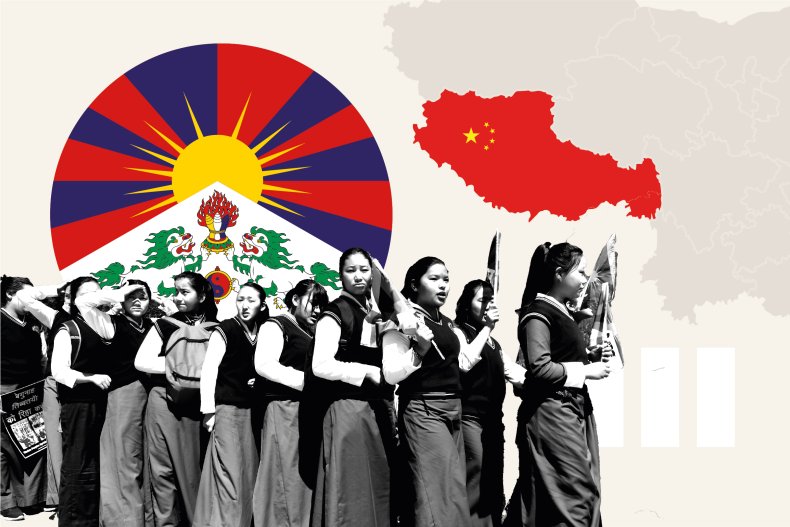 A photo illustration of school children holding flags as they march during the 60th anniversary of the Tibetan Uprising Day that commemorates the 1959 Tibetan uprising, in McLeod Ganj.NEWSWEEK; SOURCE PHOTO BY MONEY SHARMA/AFP VIA GETTY IMAGES
A photo illustration of school children holding flags as they march during the 60th anniversary of the Tibetan Uprising Day that commemorates the 1959 Tibetan uprising, in McLeod Ganj.NEWSWEEK; SOURCE PHOTO BY MONEY SHARMA/AFP VIA GETTY IMAGESCompared to the unprecedented atrocities in Xinjiang, the U.S. government and Congress find their options limited on Tibet, beyond providing a platform for public awareness and supporting religious freedom.
"In Xinjiang, the U.S. determined it was genocide," Zenz said. "In Tibet, there's not the evidence to make a genocide determination.
"The U.S. has introduced legislation against the import of products made from forced labor. For Tibet, you have two problems. Firstly, the forced labor situation is not as severe and it's less documented. Secondly, the connection to international supply chains is far weaker than in Xinjiang. Xinjiang has cotton and all kinds of products. In Tibet, it's almost nonexistent.
"So the legislation in the United States on Tibet has focused more on religious freedom and the selection of the next Dalai Lama. It's a little bit more difficult probably to combat a long-term strategy of cultural genocide as the one we see in Tibet with specific countermeasures."
Activists who seek Tibetan independence from China might be hard-pressed to find support from the U.S. and other governments for their ultimate aims, but there's a lot of shared interest in the near term to guarantee basic rights on the ground.
"Talk about Tibet. The U.S. and Canada have a most important role in terms of leading, especially with the responsibility of our own history. We need high-level public statements of concern and condemnation of the system," Tethong said.
"Every day that goes by, every year that the system is allowed to exist, we are moving closer and closer to our entire future generation of Tibetans in Tibet being unable to speak Tibetan and being completely culturally removed from their Tibetan roots and their Tibetan history."
Zeya said she would continue the Biden administration's close coordination with Congress "to sustain and deepen our strong track record of support to the Tibetan community.
"I am committed to working closely across the U.S. government and with our congressional allies to devise innovative policy and programming solutions to support Tibetans."
No comments:
Post a Comment